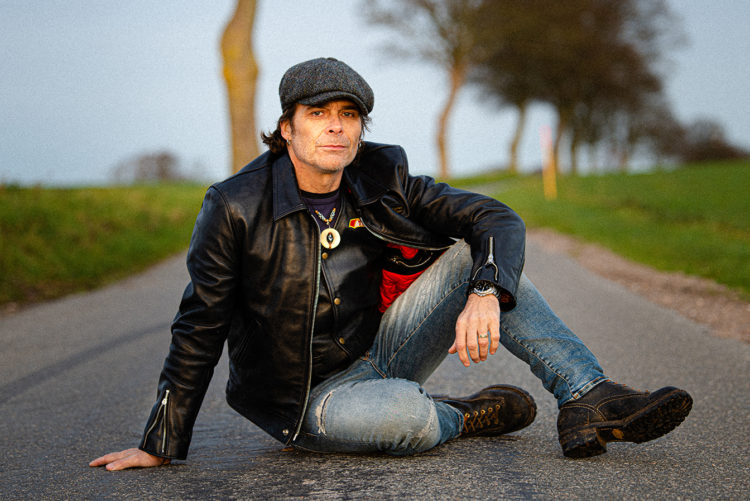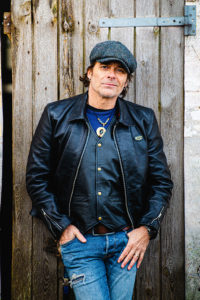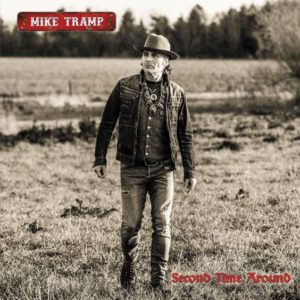
Best known to the casual rock fan as the former founder, lead vocalist and songwriter for 1980s melodic metal darlings White Lion, Mike Tramp has spent the better part of the last quarter century striving to find his true, authentic and most creatively fulfilling voice as an artist.
For the past handful of solo albums, he has become more open to baring his heart and soul, to taking a more measured, philosophical and existential approach to his writing, and the result has been, arguably, some of the most compelling, evocative and connective material he has ever done over his nearly 45-year career as a professional musician.
On May 1, Tramp releases what could best be described as a musical exploration of his life, his loves, his reality and his continued passion for introspection and observation – the album Second Time Around through Target Records. It is the culmination of one of his most prolific and profound writing experiences and as a singer, a composer and musician, he leaves it all on the floor in a way that is enlightening and engaging. It is the sign of an artist who his hitting his creative stride and is bringing us all along for the interesting ride.
Although he went solo in 1996 and derived satisfaction from his solo output, he was lured back to the rock and roll world and the world of White Lion more specifically in 2004, as Tramp formed what was initially called Tramp’s White Lion, and by the end of a four-year run, was simply booked and promoted as White Tramp. But Tramp admits his heart wasn’t into it and that, in hindsight, it was probably a mistake to try and recapture the past, especially after trying for a number of years to literally make a name for himself under his own name.
After another attempt at a rock band, called Mike Tramp & The Rock ‘N Roll Circuz folded in 2010, he went through what could best be described as an intense period of self reflection and isolation, as he tried to figure out where he wanted to go next with his music career. The answer was as simple as it was profound – in order to move forward, sometimes we have to move back. In Tramp’s case, it was to go back to the music that first inspired him to be a musician, vocalist and songwriter in the first place, the music that moved his soul and spirit and fulfilled him as a creative entity.
The result was the critically acclaimed, acoustic/roots driven album Cobblestone Street released in 2012. It was at this point, Tramp believes he finally ‘found his true voice,’ and has continued to follow that inner muse through now five more albums of deeply personal, relatable, and acoustic driven music, including Second Time Around.
“You have to step back a bit to the mid-1990s, and after White Lion and then Freak of Nature, which were my second and third bands, I knew that I was going on a solo path, that I couldn’t give my heart and soul anymore to a band, because I put everything into the band. Even though the band has always been my band, because I started them and fueled them, which I started writing my first album Capricorn {released in 1997] I didn’t need to search for how I was going to sound by myself, because I have always sounded the same way. When I delivered a song in White Lion, [guitarist] Vito Bratta and I wrote all the songs together, and if I came in with an idea, or he came in with an idea, we would always, at the end of the process, turn it into a White Lion song together,” he said.

“If I brought something in, it would resemble what I am today as a writer. That is my part of the songwriting team of White Lion. Vito would take my, for lack of a better description, Tom Petty, Bruce Springsteen, Bob Dylan, John Mellencamp kind of rock and roll, and add those 1980s guitar riffs and we would cater the production to that big hair style that was out there at the time.
“But when I really started looking at the foundation of my songwriting in 2010 and 2011, I realized it was as simple as me being me. And it goes back to when my mom gave me my first acoustic guitar, and I grew up on Bob Dylan, on Roy Orbison, on Elvis, on Johnny Cash, and on a lot of Danish folk artists of the late 1960s. I basically became like a campfire guitar player that was able to entertain the rest of the youth club when we went on weekend trips or things like that. And maybe somehow, it stuck in me that this is what music and writing songs is about. Later on, I started noticing that I was really dying to tell my story, and sing about myself, and not even having to research to see if its correct because it’s like, hey man, I lived this thing, of course it’s correct.”
He said each solo album since Cobblestone Street (which is the name of the street he grew up on in Denmark) he has dug deeper and deeper into his psyche, exploring the themes and style of music that has always been central to his creative core. At the same time, he is using the experiences and lessons learned and the wisdom gained from being able to look back at his career, from his pre-White Lion youth, to the heady late 1980s when the band were bona fide MTV and rock radio sensations, through to his Freak of Nature and then solo journey.
“I had to live my life and live that life before I could sing about it and write about it. When I look at my heroes, like Elton John, the Stones, Queen, Thin Lizzy or Springsteen, Petty and the American stuff like that, I have always been fascinated when someone is able to get their point across so early in their career. Whether it’s Hendrix or Led Zeppelin or Van Halen, they were making some of their best tracks on their first or second albums, which were almost never surpassed in their career,” Tramp said, getting reflective.
“It’s difficult to say if its because they were so focussed at the time, or whether it was because there was a space and no one else had taken that space, but it’s a fact that with those first couple of albums, you don’t question those artists’ authenticity or truth in anything they play or sing. For me, I am actually happy that it came later in my life, that it came in 1996. Because there were times in the 1980s where the industry and the press didn’t really accept it if you wanted to talk more seriously about your music. And I also knew that I couldn’t really back it up all the way. So, once I finally made that decision to go solo it was because I had arrived at a place where there was no question of who I was and who I would be for the rest of my life.
“And I had to go through the White Lion period to get there. In all fairness, I could not have backed that sort of seriousness back then. In 1988 I was at the best place that I could absolutely imagine. I did not want to be any other place. I did not want the Telecaster around my neck that I have now. I wasn’t focussing a lot on my large Martin acoustic guitar collection and stuff like that. I was worried more about what kind of pants I was going to wear at the next show, and how many times I could change my shirt in 55 minutes supporting AC/DC. That was the focus because that was the name of the game then. That was what was required from you because your competition was doing the same. At the time, I didn’t know how, or didn’t have the balls to go against the grain because nobody in that moment wanted to lose what they had gained.”
Second Time Around’s first single, The Road, is about as autobiographical a song as you can get, as it essentially sees Tramp looking back on where he’s been, how that’s led him to where he is now as a man and as a songwriter/artist, and to the path that he is currently journeying forward along.
“In general, it is about the life that I have been dealing with since I was 15 ½ years old, joining my first band, leaving high school without a final diploma etc. etc. And being tossed around the ropes, being put down, being doubted, being questioned, being pushed back, and this has always been the core to most Mike Tramp songs, as it is on The Road. There are always threads of that in all my songs; you could even jump back to White Lion and the song Little Fighter. It’s about believing in yourself. Don’t follow anybody but yourself and just go with it, and give that choice time to develop, don’t be in a rush,” he said.
 “I am very, very confident and completely satisfied as an artist these days. But at the same time, for me to be the artist that I am now, I haven’t necessarily taken the easy road, because I only do what I do. I have been my own manager for 22 years. I do everything myself. I do work with other people to do certain things, but I don’t trust anyone anymore. Most people don’t have even half the energy that I have. I enjoy taking my creation, which is in this case my songs, all the way and bringing them to the people. That’s sort of what The Road is talking about – the way my life as an artist is now.
“I am very, very confident and completely satisfied as an artist these days. But at the same time, for me to be the artist that I am now, I haven’t necessarily taken the easy road, because I only do what I do. I have been my own manager for 22 years. I do everything myself. I do work with other people to do certain things, but I don’t trust anyone anymore. Most people don’t have even half the energy that I have. I enjoy taking my creation, which is in this case my songs, all the way and bringing them to the people. That’s sort of what The Road is talking about – the way my life as an artist is now.
“Because that is what I am doing, bringing my music to the people in a very real way, a way that is really connecting with people. Right after the show, I put the guitar away and maybe pack up my little pedal board and go down and sometimes I will be standing there for an hour and a half meeting and greeting fans, regardless if there are 50 people in an audience or 250 people. So, the show is about two hours on stage, and might even be longer, and then often more than an hour after the show. And then I get in my car the next day and drive eight hours and do it again.”
Another excellent composition, Between Good and Bad, is a pretty self-explanatory title as it relates to the choices Tramp has made in his life, which are common choices that most of us also have to make regardless of our choice of profession or lifestyle.
“There are times when you can see the song as being about you the listener. Obviously during my life, the story that I am telling you now will not necessarily be resembled in the lyrics, but that’s just because I am choosing to use a single person as a metaphor. Listen, I had to choose, very early in my life, between good and bad. And in most cases I felt I was the bad, because when I chose for me to give myself to rock and roll, I would have to leave my family in Denmark. Which I did. So that was me making a decision for myself that was just focused on me. I spent the first three years in Spain and then I moved to the U.S. and it was all about doing everything necessary for the cause of me going forward in my music career. Once a year I would go back to visit my mom and my brothers for two weeks and then I would get back on that plane and it would be all about me and my music career again,” Tramp explained, adding that it also has meant spending time away from his three children and wife for extended periods of time. He has a 26 year old son by a previous relationship, a 14-year-old daughter and 11-year-old son by his current wife, Ayu Azhari, one of Indonesia’s top female actors, who lives full time in Indonesia, although part of his choice to focus on his career has meant shielding his personal and family life from the media and fans.
“With my first band, we had 99.9 per cent young girls following us. It was like David Cassidy, The Osmonds or the Bay City Rollers at the time. The guys in the band would always point out the window at the girls and tell me that they are our fans, so we don’t have anything to do with them outside being our fans, meaning we’re not going to drag anyone into the house and have sex with them. So, they shielded and protected me for those years, because I was so young, and how it would be bad for the career to be falling in love all the time. And I took all those lessons with me to the States. When I finally had my first girlfriend, which was a woman much older than me, I always kept my private life very separate.
“And bit by bit, I just became like that all the time. In the long run, I realized that I had been so dedicated to that philosophy that I didn’t even want one single fan out there knowing I was married and had a family. It was something that I built up and built up, so you’re always caught up in that ‘damned if your do, damned if you don’t,’ good or bad scenario.”
Tramp said he was supposed to have started a U.S. tour on April 15, which would have gone until the end of June. Now, dates have been tentatively rescheduled starting Aug. 26. He also said he is thinking, instead of just popping up north of the border for a couple of select dates on that tour, to actually book a dedicated coast-to-coast tour of Canada.
For more information on any tour dates, as well as other news and Second Time Around, visit his social media channels or www.miketramp.dk..
- Jim Barber is a veteran award-winning journalist and author based in Napanee, ON, who has been writing about music and musicians for 30 years. Besides his journalistic endeavours, he now works as a communications and marketing specialist. Contact him at jimbarberwritingservices@gmail.com.
SHARE THIS POST:
